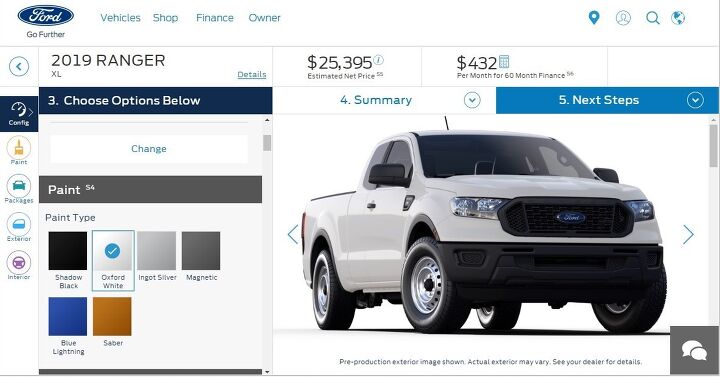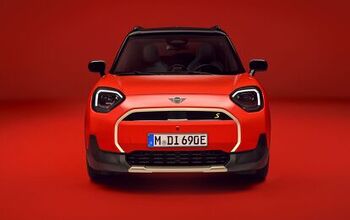The Ranger's No Cannibal, Ford Says

Good news: the Ford F-150 will not be discontinued as a result of the runaway popularity of the 2019 Ford Ranger. Phew.
As the Blue Oval readies its midsize pickup for a winter launch, Joe Hinrichs, head of global operations, claimed Monday that the automaker doesn’t expect much cross shopping among would-be Ford pickup buyers. Frankly, this would have only been a concern if buyers focused on a truck’s tow rating and nothing else. Still, Hinrichs felt it needed to be said.
Ranger folks are not F-150 folks.
“There always will be some substitution, but this is more of a lifestyle vehicle for people who want to use it for different purposes,” Hinrichs said at the Ranger’s Detroit-area plant ahead of production kick-off. “The F-150’s gotten bigger over time and more expensive. We believe there’s room now to slot the Ranger in very nicely in the showroom.”
Ford raised considerable ire in the TTAC den with its lofty pricing compared to other midsize options. A base Ranger SuperCab XL starts at $25,395 with destination, rising to just shy of the $30k threshold with four-wheel drive added. Moving to an XLT 4×2 requires an outlay of $29,035. Of course, the sky’s the limit for deep-pocketed buyers.
What Ranger buyers can’t count on at launch is helpful incentives, something 2019 F-150 buyers already have access to. Minus available incentives, a 2019 F-150 XL regular cab starts at $29,68 after destination. The SuperCab XL retails for $33,735. Looking to build from that entry-level starting point? Tack on $4,645 for four-wheel motivation, $995 for Ford’s sweet 2.7-liter EcoBoost V6, or $1,995 for a 5.0-liter V8.
F-150 buyers gain a substantial increase in real estate for their extra cash, which is why the bigger pickup will continue serving a replacement for the traditional family sedan. The lifestyle buyers Hinrichs envisions won’t see much of a decrease in towing capacity, as the Ranger’s turbo 2.3-liter four-cylinder provides enough oomph (270 hp, 310 lb-ft) to tug 7,500 pounds, just 200 lbs shy of the max rating of a base F-150 XL with 3.3-liter V6. That’s more likely to swing buyers from the Ranger’s midsize rivals.
Over the first nine months of 2018, midsize truck sales grew 18 percent in the U.S., despite the market’s overall stagnation.
[Image: Ford Motor Company]

More by Steph Willems
Latest Car Reviews
Read moreLatest Product Reviews
Read moreRecent Comments
- TheEndlessEnigma Hybrids and PHEVs make sense, EV's do not.
- Ajla My understanding is that the 5 and 7-Series cater almost exclusively to the Chinese market and they sell them here just so they don't look weak against Mercedes and Audi.
- EBFlex Interesting. We are told there is insatiable demand for EVs yet here is another major manufacturer pivoting away from EV manufacturing and going to hybrid. Did these manufacturers finally realize that the government lied to them and that consumers really don’t want EVs?
- Kwik_Shift_Pro4X What's worse than a Malibu?
- MaintenanceCosts The current Malibu is poorly packaged; there's far more room inside a Camry or Accord, even though the exterior footprint is similar. It doesn't have any standout attributes to balance out the poor packaging. I won't miss it. But it is regrettable that none of our US-based carmakers will be selling an ordinary sedan in their home market.



































Comments
Join the conversation
It's the new iFord XS. Perfect for kids and groceries or when the iFord XS Max is just too much. Soon to be available in the King Starbucks Ranchmart Depot Play Edition with lots of fun mocha frappe latte colors!!
"The F-150’s gotten bigger over time and more expensive. We believe there’s room now to slot the Ranger in very nicely in the showroom.” This seems like an odd thing for the head of global operations to say, because while it is technically true, the physical size difference between an old and new F-150 is less than the difference between an old and new Ranger: https://www.reddit.com/r/cars/comments/9pehn8/ ford_just_confirmed_that_there_will_be_no_ranger/e87p6tc/